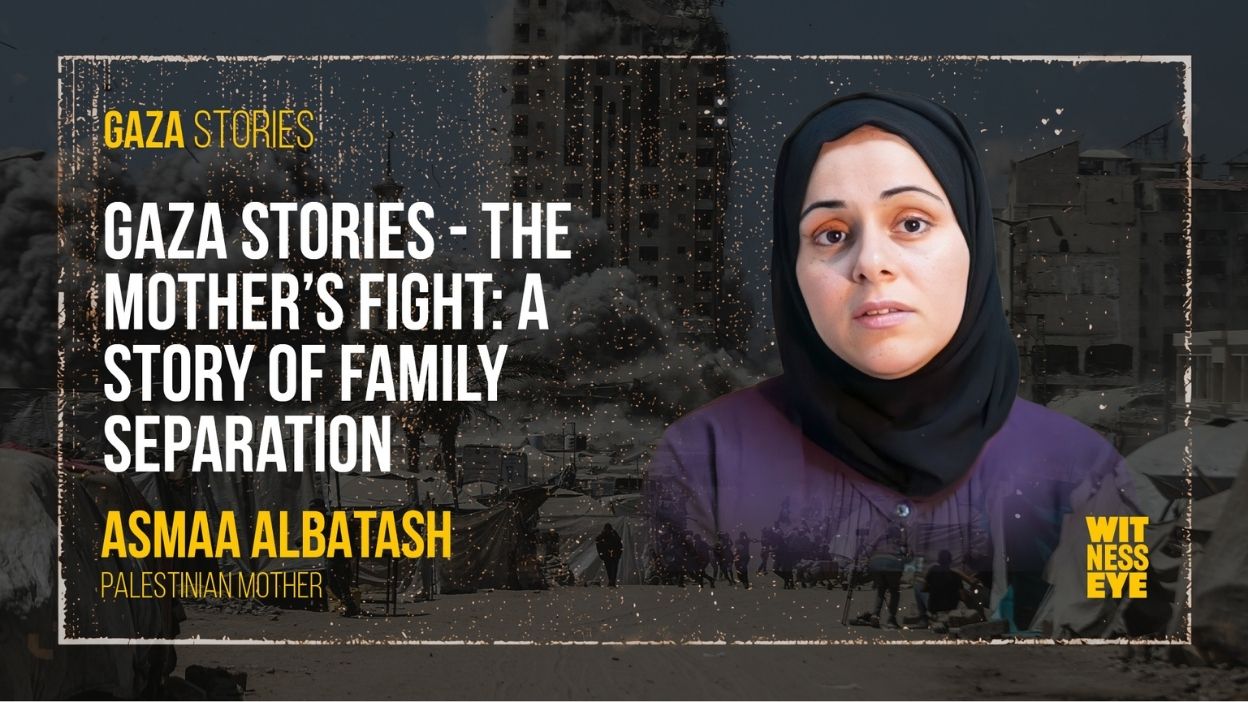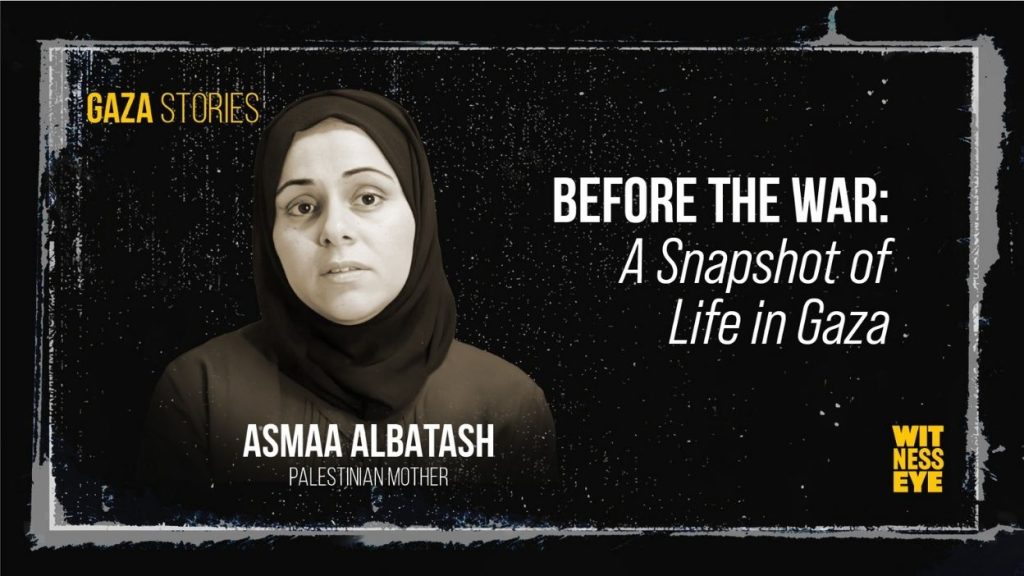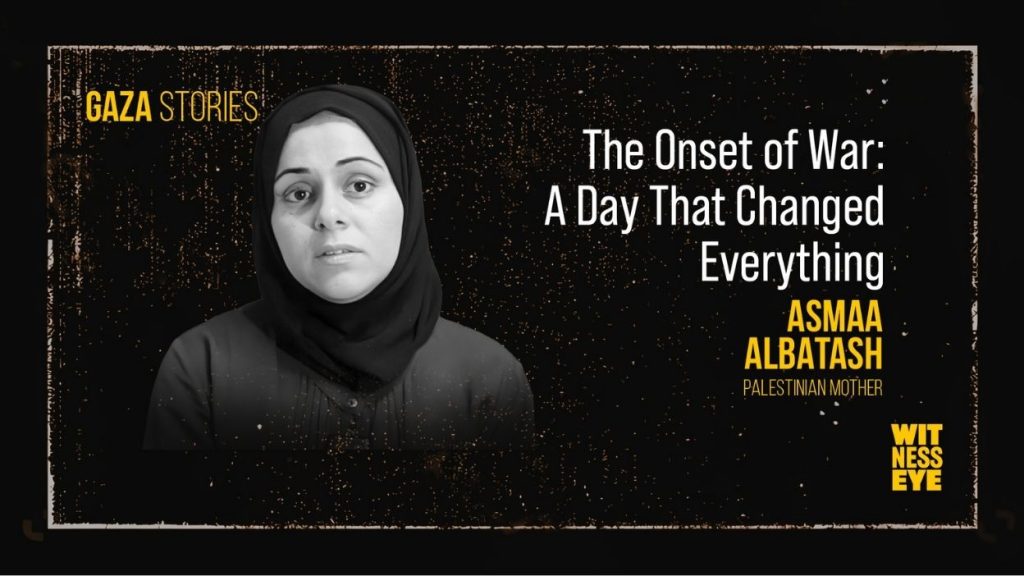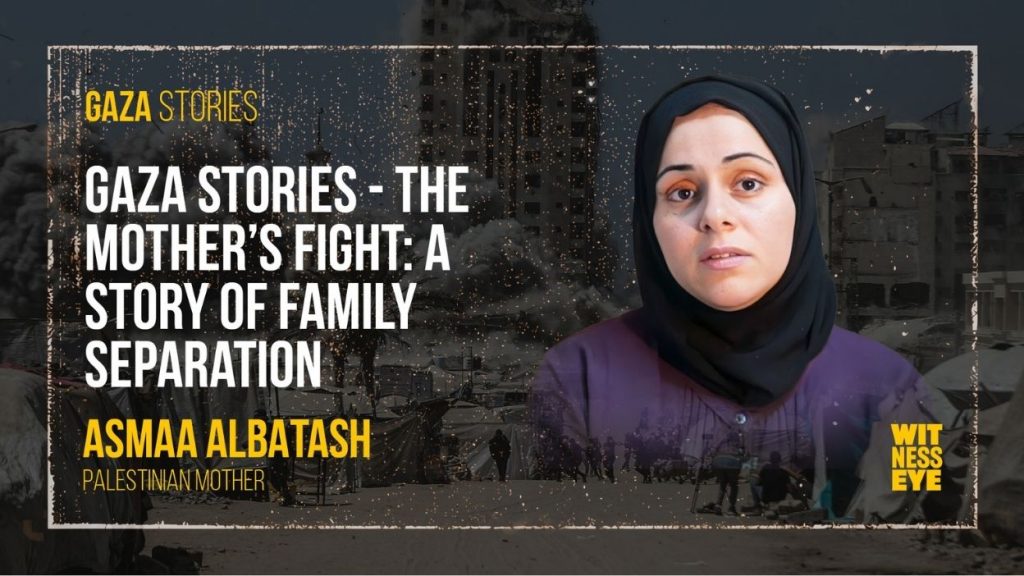
The war on Gaza has left scars deeper than any bomb blast. The pain and suffering of its people extend far beyond the destruction of homes and infrastructure. It reaches into the very hearts of families, ripping them apart and altering their lives forever. Asma Al-Batsh’s story is one of unimaginable loss, heart-wrenching separation, and an unbreakable will to survive. A mother of two, Asma’s journey through the horrors of Gaza’s destruction offers a glimpse into the strength of its people, the resilience of its survivors, and the haunting reality of living in the crossfire of a never-ending war.
In the heart of the Gaza Strip, where bombings are routine and life is fraught with fear, Asma’s family once lived a simple but content life. As a law graduate and a mother, she had hopes and dreams just like anyone else. But as the war escalated, her family’s dreams were shattered in a matter of moments.

Before the War: A Snapshot of Life in Gaza
Before the war, Asma Al-Batsh lived with her husband, Muhammad Al-Batsh, and their two children in Jabalia, a city in the northern part of Gaza. Asma was a graduate of Al-Azhar University, with a law degree, and her husband had a literature degree from the same university. Their life was simple and peaceful, and though they faced the hardships of living under a blockade, they had found contentment in their small family unit.
“My life was like that of any mother with two young children. We had everything we needed, and we were happy,” Asma recalls with a soft but sorrowful voice. “Life was simple, until October 7th came.”
For many families in Gaza, Gaza Stories are a blend of daily struggles, fleeting moments of joy, and an underlying tension caused by years of occupation. Asma’s family had hoped to continue their lives peacefully, but as the war escalated, all of that was taken away in an instant.

The Onset of War: A Day That Changed Everything
October 7th, 2023, marked the beginning of a new nightmare for the people of Gaza. For Asma and her family, that fateful day would turn their world upside down. As airstrikes intensified, their once peaceful neighborhood in the northern part of Gaza became the target of bombing campaigns. Asma and her family were forced to leave their home in the dead of night.
“We had to evacuate immediately,” Asma explains. “We didn’t even have time to gather our belongings. Our home was too close to the border, so we moved to my husband’s friend’s house in the central part of Gaza. We thought it would be safer there.”
This sudden displacement marked the beginning of a long and painful journey. The Al-Batsh family moved in with relatives, unsure of where to go next or how long the violence would last. They had no choice but to leave their home and their lives behind. This experience is shared by many, as Gaza Tribunals aim to shed light on the displacement and suffering of countless families caught in the conflict.
November 21st: The Day the Bomb Fell
A month after being displaced, Asma’s family found themselves in a precarious situation. The airstrikes in their new location intensified, and they had no choice but to move once again. This time, the family made the difficult decision to travel south, away from the frontlines. But, as Asma recalls, leaving was not as simple as it seemed. The situation was dire. We couldn’t move south right away because the checkpoints were heavily monitored. The inspections were grueling, and we were terrified, especially because we had children with us,” Asma recalls. “Even basic necessities like food and water were scarce, and transportation was anything but secure.”
On the evening of November 21st, Asma and her family were targeted in a bombing attack. “We had just finished dinner, and we were preparing to sleep when the airstrike hit. There was no warning. The building we were in was destroyed in seconds. The entire floor collapsed, and we were buried under rubble,” Asma recounts.
It was a civilian home, occupied by people who had no connection to any political group, yet the building was still targeted. “The building was three stories high, and around 25 people were in our part of the house,” Asma continues. “All of them were killed. Only my family and I survived.”
This is a tragic example of War Crimes Documentation in Gaza. The bombing was sudden, without any warning, and its impact was devastating. The pain of losing so many people, many of whom Asma had come to know during their time of displacement, is almost too much to bear.
A Mother’s Survival: Buried Under Rubble
After the bombing, Asma was left buried under the rubble, unconscious. It wasn’t until the following day that she was rescued and taken to a hospital. She was among the last to be pulled from the wreckage. “My husband and daughter were rescued earlier, but their condition was critical,” she recalls. “My daughter lost her right eye and suffered a skull fracture, while my husband was in a coma for three months.”
Asma’s survival story is a testament to the resilience of the people of Gaza. Despite the unimaginable horror she faced, her will to live and fight for her family never faltered. “My son and I were the last ones to be pulled from the rubble. We were saved, but so many others perished,” Asma says with a heavy heart.
In Gaza Testimonies, survivors like Asma share their stories of survival and loss. These testimonies are critical for documenting the atrocities that took place in Gaza, as they serve as a record for future generations and an indictment of those responsible for these crimes.
Family Separation: A Heart-Wrenching Struggle
One of the most painful aspects of Asma’s story is the separation from her daughter. While she and her husband were transported to Turkey for medical treatment, their daughter, who was severely injured, was left behind in Gaza.
“The hardest part was leaving my daughter behind,” Asma says, her voice cracking. “I had to make the decision to leave her because my husband was in critical condition, but I couldn’t bear the thought of being separated from her.”
Asma’s daughter, who was just five years old at the time, had to stay in Gaza, far from her mother. “We were in the south when my husband’s family took my daughter to the north. There was no communication, no way to reach her,” Asma reflects. “It was painful, knowing she was suffering and I couldn’t be there with her.”
This heartbreaking separation is not unique to Asma. Family Separation has been a recurring theme in Gaza, as families are torn apart by the violence and the occupation’s policies. The emotional toll of being separated from a loved one, especially a child, is devastating and is something many survivors continue to endure.
The Trauma of War: A Psychological Wound
The emotional and psychological toll of war is often overlooked. Asma’s daughter, like many other children in Gaza, was forced to grow up in the shadow of violence. “At first, she refused to talk to us. She thought we had abandoned her,” Asma explains. “But now, she understands that I tried to bring her to me. She says, ‘I miss you, Mom, and I miss my brother.’”
The psychological scars left by the war are deep, and children, in particular, are vulnerable. Asma’s daughter’s internal conflict—wondering if she was abandoned or left behind due to circumstances beyond her control—mirrors the experience of many other children in Gaza. The war has stolen their childhood, leaving them with confusion, fear, and trauma.
In Gaza Genocide, the genocide and war crimes committed against the civilian population continue to reverberate in the hearts and minds of those who survived. Asma’s story is a clear example of the lasting impact of war on the mental health of both children and adults.
The Struggle for Justice: A Legal Perspective
As a law graduate, Asma has a unique perspective on the events that unfolded in Gaza. She sees the actions of the Israeli military as clear violations of international law. “It’s obvious,” she asserts. “It’s a genocide. The targeting of civilians, schools, hospitals—it’s all part of a larger plan to exterminate an entire population.”
Asma’s understanding of the law allows her to see the systematic nature of the violence. “This isn’t a random occurrence. It’s a deliberate strategy to destroy Gaza and its people,” she says. “The international community must stand up and demand accountability.”
The path to justice for the people of Gaza is long and difficult, but Asma remains hopeful that through efforts like the Gaza Tribunal, the truth will eventually come to light and those responsible will be held accountable.
The Future of Gaza: Hope Amidst the Darkness
Despite the overwhelming challenges, Asma remains hopeful for the future. “God willing, things will get better. I have to believe that,” she says, her eyes filled with determination. “It’s a struggle, but we have to keep fighting for our families, for our children, for our future.”
For Asma, the struggle is not over. She dreams of a day when she can reunite with her daughter and return to Gaza, a place that has both given her life and torn it apart. But even in the face of unimaginable loss, she remains resilient. Witness Eye and other organizations are documenting these stories to ensure that the world does not forget the horrors that have befallen Gaza and the people who continue to endure.

Gaza Stories – A Mother’s Journey Through War
Asma Al-Batsh’s story is a reflection of the thousands of families whose lives have been shattered by the conflict in Gaza. It is a story of survival, resilience, and an unbreakable will to keep fighting. Despite the overwhelming odds, Asma remains hopeful for a better future for her children and for Gaza.
Her journey is not just a personal one—it is a collective story of the people of Gaza, whose pain, suffering, and hope must not be forgotten. The war may have torn her family apart, but it has not broken her spirit. As long as there are voices like hers demanding justice, the world will continue to hear the stories of Gaza’s survivors.
Now, hear the testimony of Asma Al-Batsh in her own words—survivor of war and family loss, mother enduring Gaza’s devastation, carrying its grief, memory, and unyielding call for justice into the record of history.
Stay Connected with Witness Eye
Follow us on our official channels:
